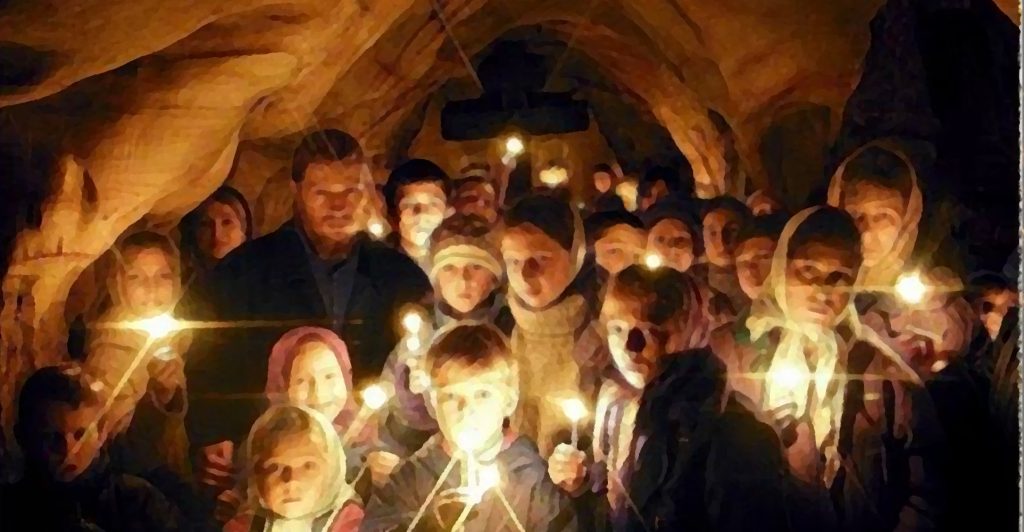
by Fr. Jonathan Cholcher
“For this reason I bow my knees to the Father of our Lord Jesus Christ, from whom the whole family in heaven and earth is named…” (Eph. 3:14-15)
Whenever we Christians speak of “family,” especially in this day and age and culture, we have to carefully define the term within a Christian context, particularly that of the Scriptures and practice of the Church. Taking the passage above, the context of the Apostle Paul’s letter to the Ephesians gives us such a definition, as follows.
The recipients of the letter in Ephesus are called “saints (lit., holy ones)…adopted as sons by Jesus Christ to Himself…accepted in the Beloved” (i.e., the Lord Jesus Christ; 1:1, 5, 6). The sons of God, together with all things in heaven and on earth, have been “gathered together in Christ,” and they are “sealed with the Holy Spirit of promise” (1:10, 13). Furthermore, the saints, the adopted sons of God, are the “church (lit., assembly), which is [Christ’s] body (He is the head), the fullness of Him who fills all in all” (1:22-23).
The adopted sons of God were formerly “sons of disobedience who once walked according to the prince of the power of the air (i.e., the devil)…fulfilling the desires of the flesh and of the mind”; however, the saints were “raised with Christ and seated together in the heavenly places in Christ,” who were “saved by grace through faith…created in Christ Jesus for good works…to walk in them” (2:1-10). Christ created in Himself “one new man from the two (the Jews and Gentiles) by the Cross…For through Him we both have access by one Spirit to the Father” (2:11-12, 15, 18). The adopted sons of God are now “fellow citizens…members of the household of God…a holy temple” (2:19, 22).
The Apostle Paul discloses a mystery of our existence “which in other ages was not made known to the sons of men,” namely, that “the Gentiles (lit., nations [of the earth]) should be co-heirs, of the same body, and co-participants of the promise in Christ Jesus through the gospel” (3:1-6). This is the ultimate definition of family: beloved children of God through faith in the Son of God, Jesus Christ, gathered out of sin and death in a communion of love together with the angels and all of creation in the harmony of the Church, energized by the Spirit of God to accomplish God the Father’s eternal purpose.
Therefore, the Apostle continues his prayer for the whole family: “that [the Father] would grant you, according to the riches of His glory, to be strengthened with might through His Spirit in the inner man, that Christ may dwell in your hearts through faith; that you, being rooted and grounded in love, may be able to comprehend with all the saints what is the width and length and depth and height – to know the love of Christ which passes knowledge; that you may be filled with all the fullness of God. Now to Him who is able to do exceedingly abundantly above all that we ask or think, according to the power that works in us, to Him be glory in the church by Christ Jesus to all generations, forever and ever. Amen” (Eph. 3:16-21).
For Christians, the family of God in Christ provides not only the proper but the exclusive context for achieving our true potential of existence in relationships to God the Holy Trinity and one another in our various stations in life. The family of faith does not disregard or abolish our other created family ties whether biological, tribal, or cultural; rather, the family of faith assumes these other ties and brings them to their ultimate purpose in the unity of faith and love toward God the Creator.
Our Lord Jesus Christ intimated the same truth of family in this way. “Do not think that I came to bring peace on earth. I did not come to bring peace but a sword. For I have come to ‘set a man against his father; a daughter against her mother; and a daughter-in-law against her mother-in-law’; and ‘a man’s enemies will be those of his own household’ (quoting from Micah 7:6). He who loves father or mother more than Me is not worthy of Me. And he who loves son or daughter more than Me is not worthy of Me” (Matt. 10:34-37). Again: “And [Jesus] stretched out His hand toward His disciples and said, ‘Here are my mother and My brothers! For whoever does the will of My Father in heaven is My brother and sister and mother” (Matt. 12:49-50).
Obviously, our Lord Jesus had a biological mother, the Virgin Mary, and a step-father, Joseph, whom He honored and to whom He was subordinate (Lk. 2:51). Furthermore, Christ Jesus identified Himself genealogically and culturally with the Jewish people in particular, and the entire human race in general (Matt. 1:1-16; Lk. 3:23-38; Jn. 4:22). Yet this “perfect Man” (Eph. 4:13) assumes our nature and relationships in order to manifest an even greater interconnection within the trinitarian family of God Himself, the Father, Son, and Holy Spirit. “Did you not know that I must be about My Father’s business?” (Lk. 2:49); and, “But as many as received Him, to them He gave the right to become children of God, to those who believe in His name; who were born, not of blood, nor of the will of the flesh, nor of the will of man, but of God” (Jn. 1:12-13).
St. John of Kronstadt warns of the sin of “being too attached to my parents, children, relatives and friends.” This is because we tend to reduce everything in life to the level of this world and ignore our higher purpose. Christians strive to maintain all the God-given – and thus godly and acceptable – family ties we have in this mortal existence: man/husband/father and woman/wife/mother; grandparents, parents and children; friends, community, and country; all human beings created in the image and likeness of God. But we Christians, especially so, must understand these earthly ties as steps climbing to a higher calling, namely, to be the family of God in faith and love in Christ, manifested most clearly in the Church, the Body and Bride of Christ (Eph. 5:21f.).
The family of the Church has a birthing process (Baptism and Chrismation), a process of child-rearing (doctrine, prayer, iconography, and ascetic manners), the family Meal (Divine Liturgy of the Lord’s Supper, Holy Communion), mandatory care of the helpless and infirm, and the ultimate reason for being and multiplying, that is, the Kingdom of God. The family of the Church has its own language and culture (mind-set) fixed in the heavens and conveying a different way of living, a way of living in harmony with the eternal will of God. In this family of Christ we have been renovated truly to know God and one another as we ought.
